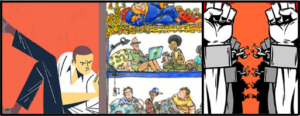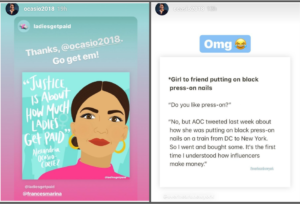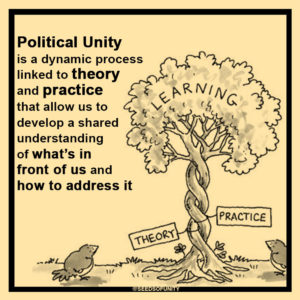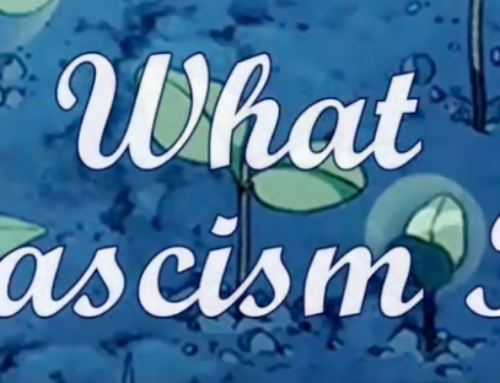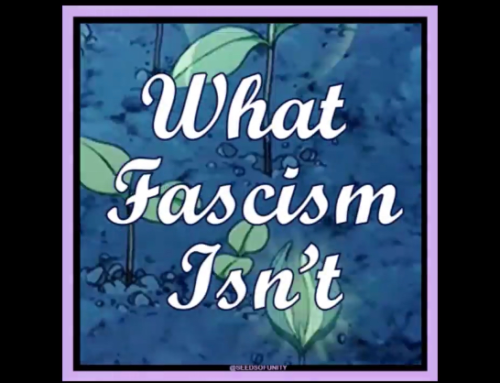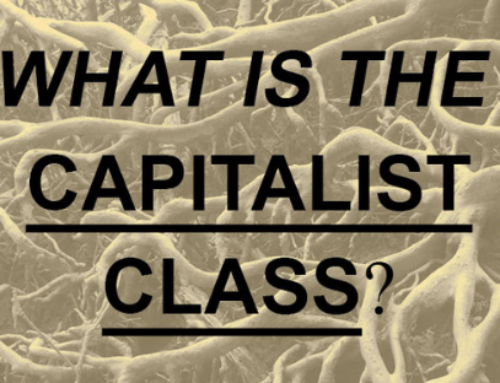One Struggle has addressed the concept of a progressive militant in the past, but as we see capitalist and imperialist powers continue to adapt to ideas meant to move us beyond this current social, economic, and political arrangement, we must continue to reclaim the term and insist on our definition of what is truly progressive.
In order to continue reproducing its dominance over the entire arrangement of society, the capitalist/imperialist classes must transform expressions of class struggle to serve their own interests. Concretely, we can see this expressed in the way that narratives of past progressives become bastions of capitalist ideals like democracy, individualism, and competition whenever those past movements resulted in concessions being made to the people. This constant revision of history not only serves to obscure the past, but also the fundamental contradictions class struggle reveals. An example can be found in how the term “progressive” is widely used today: in order to obscure how the masses are dominated, its meaning is reduced to anything opposing conservatism.
To reclaim what is progressive, we have to recognize how we’ve come to mistake an expression of class struggle – in this case, the struggle between different fractions of the capitalist class – for action that can actually advance history in the interests of the people. Right now, we can observe two strong tendencies in this process: the tendency to limit political life to electoral politics, and the tendency of hero worship.
Since the last round of elections, where we saw a record number of women and people of color elected to congress, a handful of figures have been buoyed to the surface of U.S. consciousness as the answer to the Fascist block embodied by Donald Trump. Congress members like Ilhan Omar, Deb Haaland, and Alexandria Ocasio-Cortez have consistently made headlines for the “firsts” they’ve accomplished as signs of apparent progress. What they actually represent is a capitalist alternative – embodied in things like the Green New Deal, Medicare For All, and abolishing ICE to reinstate the INS (a “kinder” tool of imperialist violence). These proposals seek to open new industries and markets while insisting on a brand of capitalism that is allegedly humane. In reality, they still host dozens of contradictions that are inherent to this current moment of capitalism and imperialism – how does starting new green businesses in the U.S. address the havoc we’ve wreaked extracting resources from abroad? How does Medicare For All address the domination of pharmaceutical companies in medical research and practice? How does a diverse class of oppressors help us cast off our oppression and exploitation?
Bourgeois democracy was never meant for us, and bourgeois democratic rights are meant to satiate the instincts of the masses to engage in class struggle. Figures like Ocasio-Cortez and Omar certainly pose a threat to established bureaucrats seeking to further their own alternatives to capitalism’s current crisis, but they DO NOT pose a threat to capitalism. Instead, they take our genuine and fervent desire to address what’s truly ailing us – a system that has reached its physical limits, that has been toxified by the rampant and unchecked accumulation of capitalists – and they funnel our energy into Progressive Hero figures who will save us.
The hero worship (bordering on obsession) that we find in politicians like Ocasio-Cortez, and even cultural figures like Colin Kaepernick, is dangerous for several reasons, but most importantly because it disorganizes the masses. When our political consciousness hinges on one person’s interpretation of the moment (which conveniently affirms our individualism, our ‘conscious’ consumerism, or our inaction) we fail to remain critical of the world around us and vigilant to opportunities to develop our own perspectives. We regurgitate the viral clips of our latest “woke baes” and call it “community” while our narratives and histories of struggle are being re-written in real time to obscure who our true enemy is. This keeps us focused on capitalist alternatives, instead of on the work of developing an alternative for the people through organization.
But just criticizing and denouncing what is not progressive doesn’t make for progressive action. What is truly progressive is that which moves us beyond the exploitation, domination, and oppression of a class divided society. A progressive alternative advances history in the interest of the masses, not of the ruling class.
In order to do this, we must be organizing ourselves. We must learn to differentiate bourgeois interests from those which serve the people, whether that’s in our politics, in our ideology, or in the decisions we make with our resources. Within our organizations, we must be collaboratively developing independent, progressive perspectives on what surrounds us and how to advance history from here. We must develop those perspectives in the interest of furthering our understanding of the contradictions of capitalism and imperialism while looking toward opportunities for weakening their arrangement.
We are not the first to attempt this work. In order to advance history we have to study the true struggles of past progressives, appropriating what applies to our current moment and rectifying the practices that lead to reformism and other distortions. In the United States, we can look to the Civil Rights Era and organizations like The Black Panthers as the last mass movement to be truly progressive. There was an incredible mobilization of people in and outside of organizations that had the potential to weaken the domination of the ruling class by connecting issues of racial segregation and police brutality to the forms and structures of capitalism and imperialism. But we can’t simply re-up on the methods of the Panthers or Martin Luther King Jr. We must recognize that a lack of democratic relationships lead to bureaucratic tendencies that ultimately made these organizations easy to neutralize. This “foot soldier” mentality meant the masses still held a low level of political consciousness and didn’t have the capacity to organize themselves when key figures of those movements were jailed, assassinated, or otherwise taken down. Outside of the U.S., we can look to National Liberation Movements like that in South Africa, where a massive movement lead to the leadership of the African National Congress, which largely failed to abolish class divisions. With the knowledge of these limitations, we have to build our own, fresh theories that resist reforming capitalism or diversifying our oppressors.
In order to prevent a repetition of these failures, we must build our own, independent organizations based on truly democratic relationships. Even among established organizations that call themselves anti-capitalist, we can see problematic relationships emerge. These are large institutions with centralized, at times dogmatic ideologies with little room for a dialectical relationship between theory and practice, between those who are organized and those who are unorganized, or even between different groups of their own members. This contributes to the current staleness of the Left and the low level of political consciousness in the U.S. These organizations correctly recognize the problem, but don’t develop the potential for leadership and repeat the same theories of the 60’s, 70’s, or sometimes even theories developed 100+ years ago. This can lead to the same tendencies we discussed above, where members become complacent in the theory and objectives of the organization and develop bureaucratic relationships and cults of personality. At worst, ignoring these problems or attempting to rehash the struggles of past progressives can lead to severe distortions.
It is only through political unity that we can hope to achieve a mass movement based on the political formation, creativity, initiative, and leadership of all the people. Through political unity, organizations have the potential to grow dynamically, in a way that allows for adaptive, flexible, and enduring struggle.
In building autonomous organizations, we recognize our own class interest and tendencies, we develop a theory around disentangling ourselves from them, and then put those theories into practice in a constant attempt to refine and revise our theory. We do this while raising the consciousness of each member so that everyone may engage in this process based on our level of political unity. We are obligated to do this as progressives who claim to seek out the destruction of capital and the end of the reproduction of the capitalist class. Because capitalism is based on social relations, we fight to transform them in our organizations.
Finally, as progressives we must seek to create the conditions for the development of a new society. While we find ways to weaken capital and the violence of imperialism/capitalism, we must also forge relationships with revolutionaries who have the capacity to build the people’s alternative from the ground up. Simultaneously, we must develop the political consciousness of those who are unorganized and even seemingly unaware of their own domination. We constantly seek out new connections on both levels – the mass level and the revolutionary level – so that we may build a mass movement based on the advancement of OUR interests.
Now is the time to make connections in our neighborhoods, in our schools, at our jobs, and among our friends that will become the social base for genuinely progressive organizations. There is not a single progressive bone left in the corpse of capitalism and imperialism. These systems are played out. In order to fight for the people’s alternative – an alternative that allows for the future of our planet and our lives – we need to get organized.
Stand Up. Fight Back. ORGANIZE.
If you agree, or want to discuss this more, get in touch.
onestruggle.southflorida@gmail.com
onestruggle.fiu@gmail.com
FB – @OneStruggle
IG – @SeedsofUnity // @OneStruggle.FIU
Twitter – @OneStruggleSF

